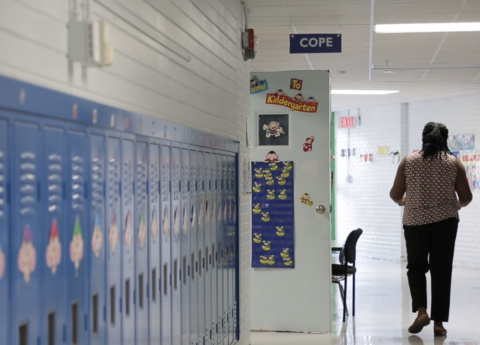One of the key questions about how charter school legislation would change education in Kentucky is how it would affect funding for traditional public schools. Looking at what has occurred in other states and how HB 103 proposes to fund charters, there are reasons for concern.
It might sound like adopting public charter schools would mean no harm to resources — traditional public schools would lose students to charter schools but would no longer bear the costs of educating them. But that’s not the case. As noted in a recent Economic Policy Institute (EPI) report, research shows charter schools often have negative fiscal impacts on traditional public school districts in large part because it is not possible for them to reduce costs on a student-by-student basis. This is of particular concern in our state as Kentucky schools — especially poorer school districts — are already struggling financially. A recent report ranked Kentucky third worst in the country when it comes to per-student cuts to state formula funding for K-12 between 2008 and 2017.
Research has shown:
These negative impacts occur through a number of channels.
- Districts aren’t able to reduce their costs on a student-by-student basis. Schools’ costs range from fixed costs (districtwide and school overhead costs that are not reduced by the transfer of individual pupils) to step costs (that include classroom level costs, which are also not reduced by the transfer of individual pupils) to variable costs, which can be reduced on a student-by-student basis but make up a relatively small share of school district budgets.
- Operating essentially two systems of public schools (traditional and charter) under separate governance arrangements can create extra costs or inefficient expenditures. As noted in the EPI report, “while inducing fiscal stress on host districts, charter expansion may also be increasing total overhead costs.” For instance, studies show that charter schools operating fiscally independently of local public school districts have particularly high administrative expenses. This higher spending is for administrative functions traditionally performed at district central offices as well as in school buildings. A study found that at charter schools in New Jersey not only were administrative expenses at charters nearly $1,000 per pupil higher than those of other schools in the district but local public school districts still had the responsibility to provide some services to charter school students.
- According to Moody’s Investor Services, the negative impacts of charters on traditional public schools are felt particularly hard in school districts that are already experiencing financial distress and in states where the approval processes for new charters are not very restrictive and where there are few limits on charter growth.
There are many examples of charter schools hurting funding for traditional public schools.
- According to Moody’s a small but growing number of school districts experience severe financial stress due to charter school expansion. Among the cities highlighted in the report were Cleveland, Detroit, Kansas City, St. Louis and Washington, D.C.
- Academic research has shown charter school expansion produced harmful fiscal impacts for school districts in Albany and Buffalo, New York.
- A consultant’s report concluded that charters in Nashville are causing the transfer of state and local per-student funds to charter schools without reducing the traditional schools’ operational costs, increasing direct and indirect costs, and worsening overdue maintenance issues at school buildings.
Some concerns about funding in HB 103 specifically are:
- HB 103 makes no mention of the fiscal impact of charters on traditional public schools in Kentucky, unlike a Senate charter school bill, which actually makes charter school approval contingent upon its minimal adverse effects on the school district in which it is located. Some states require that an analysis be conducted on the impact the new charter would have on traditional public schools.
- Unlike school districts charter schools would not be able to levy their own taxes, but HB 103 would divert a proportionate share of tax revenue generated by local districts that those districts choose to levy to fund district programs, projects and expenses. This diversion of what are called Tier I and Tier II funds from the districts that raise them (and in the case of Tier II funds, the voters who approve them) may hinder the ability of the school district to meet its obligations or to continue projects or programs funded with those revenues.
- School boards, elected by and accountable to taxpayers, would lose control over how funds they raise from taxes they levy are used when those dollars flow to charter schools. In large districts where many charter schools could be authorized, the loss of fiscal control could be significant.
- HB 103 describes the creation of a public charter school facility revolving loan program as “composed of federal funds obtained by the state for public charter schools…and any other funds appropriated or transferred to the fund by the state,” but does not clarify where in the state budget such funds might come from or how they would be appropriated. Without a specified source and process for capital funding, concerns also arise about adequate and equitable facilities for charter school students as well as reduced resources for traditional schools.
- Similarly, the bill fails to ensure adequate transportation funding for charter schools even as it diverts and dilutes already-inadequate transportation funding for public schools.
These questions and concerns about the fiscal impact of charter school legislation on traditional public schools in Kentucky need to be at the forefront of policy conversations about charters. Our public school system is already underfunded, and potential negative impacts of the proposed legislation on traditional public schools should be thoroughly understood.



